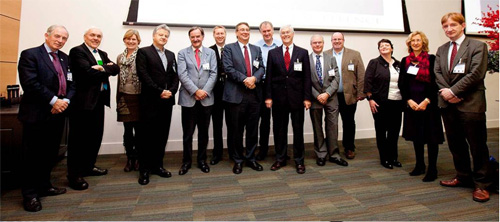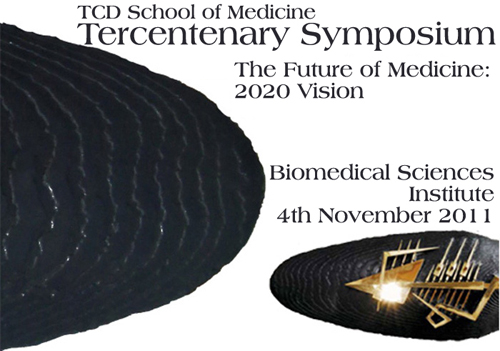Symposium Addresses ‘The Future of Medicine: 2020 Vision’
Posted on: 07 November 2011
The Institute of Molecular Medicine (IMM) at Trinity College Dublin hosted a conference recently on the occasion of the Tercentenary celebrations of the Medical School entitled ‘The Future of Medicine: 2020 Vision’.
As part of the symposium, a panel of leading international and Irish experts discussed the factors that will influence the future course of medical practice at a global level over the next ten years. The meeting explored the issues around new drug discovery and the challenges faced in developing new technological approaches. It also examined the future of post-genomic research in an era in which not only the human genome, but also individual human genomes have been sequenced informing future healthcare. Of particular importance were a discussion of issues around global health and the implications of modern research for the health of international populations.

Contributors at the ‘Future of Medicine: 2020 Vision’ conference.
Commenting on the significance of the gathering, Professor Dermot Kelleher, Director of the Institute of Molecular Medicine, Head of School of Medicine and Vice Provost for Medical Affairs at Trinity College Dublin said: “We believe that this conference will be of interest to individuals not only involved in healthcare research, but also in health policy and we expect a series of evocative and thought-provoking talks, which will encourage us to think more deeply about the challenges facing medicine in the forthcoming decade.”
The programme included a panel of international experts such as Professor Garret Fitzgerald, Chair of Pharmacology and Director of the Institute of Translational Medicine and Therapeutics at Penn University, Professor Mike Ferguson, Dean of the Division of Biological Chemistry and Drug Discovery at the University of Dundee, Professor Ray Dolan of the Wellcome Centre for Neuroimaging at UCL, Professor Sir Gordon Duff, Florey Professor of Molecular Medicine at Sheffield University and Professor Adrian Hill, the Director of the Jenner Institute at the University of Oxford as well as Professor Tom Quinn, Director of the Johns Hopkins Centre for Global Health and Professor Anthony Costello, Director, UCL Institute for Global Health.
Professor Costello who spoke on ‘Women, money and geography: challenges for global health in the 21st century” had recently authored a guest issue of the Lancet in which he has focused on the serious challenges facing the world today in terms of the impact of factors such as climate change on the delivery of healthcare and is a well recognised expert in the field. Professor Tom Quinn who spoke on ‘Delivering Health Care at a Global Level’ devoted his career to the issue of management of infectious diseases in particular HIV in an African setting.
“We are also delighted to welcome Professor Sir Gordon Duff, who in addition to being Florey Professor of Molecular Medicine at Sheffield University, he is also the Chairman of Trinity’s Academic Health Science Centre, Trinity Health Ireland,” continued Professor Kelleher. “Professor Sir Gordon Duff has served as the Chairman of the Committee of Safety of Medicines in the UK and also gave a talk on topical feature of medicine at the launch of the Institute of Molecular Medicine at Trinity College Dublin. It will be particularly exciting to reprise his original views.”
TCD experts at the conference included Professors Padraic Fallon, Orla Hardiman, Louise Gallagher and Luke O’Neill who are all international experts in their respective fields.
The symposium was sponsored by the Institute of Molecular Medicine at Trinity College Dublin which was formed consequent to the funding obtained during PRTLI Cycle 2 and from the Durkan Trust.
About the Institute of Molecular Medicine (IMM)
The Institute of Molecular Medicine is devoted to the translational molecular discovery into new technologies and approaches for the diagnosis and treatment of human disease. It drives researchers towards creative thought, descriptive knowledge, integrity and flexibility of innovation, thus permitting the rapid translation of bioscience from the lab bench to the patient in the hospital bed. The Institute of Molecular Medicine had highly successful research programmes in neuropsychiatric disease, infection and immunity and cancer which have resulted in publications at the highest level in journals such as Nature, Nature Genetics, Nature Immunology and other distinguished journals.
For full details of the programme click on: http://www.tcd.ie/IMM/conference/programme/

